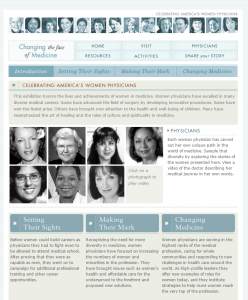Mar
01

Posted by Carolyn Martin on March 1st, 2016
Posted in: News From NNLM PNR
 The month of March is a time to reflect upon the struggles and milestones of women in our world and to appreciate the hard work and perseverance that have allowed many of us to lead better lives and to play a more prominent role in our society. However, the struggle is not over despite the many gains. It is easy to forget and take for granted the rights and privileges our foremothers worked so hard to gain.
The month of March is a time to reflect upon the struggles and milestones of women in our world and to appreciate the hard work and perseverance that have allowed many of us to lead better lives and to play a more prominent role in our society. However, the struggle is not over despite the many gains. It is easy to forget and take for granted the rights and privileges our foremothers worked so hard to gain.
Just think about how medical research and clinical care would be if it was all done by men only! What state would women’s health be in!? And not just women’s health. Many of the contributions women have made have helped everyone! Take a moment to appreciate some of the women who helped advance medicine.
In 1849, Elizabeth Blackwell received her M.D. degree becoming the first female physician in America. After graduating top of her class she went on to work in clinics in London and Paris and studied midwifery at La Maternité. Unfortunately, she had to give up her dream of becoming a surgeon when she lost the sight in one eye. She returned to New York City in 1851 where she hoped to establish a practice. However, she faced many obstacles due to her sex until her sister, Dr. Emily Blackwell, joined her in 1856, and with Dr. Marie Zakrzewska they opened the New York Infirmary for Indignent Women and Children in 1857. Then in 1868 Blackwell and her colleagues opened the Woman’s Medical College of the New York Infirmary, a medical college for women to provide the training and experience they could not get in already established medical schools.
Rebecca Lee Crumpler became the first African American woman to receive her medical degree in 1864. Unfortunately, little is known about Crumpler other than her published book, Book of Medical Discourses published in 1883. In this account, Crumpler provides a window into her career journey. Crumpler moved from Boston to Richmond, VA after the Civil War and viewed her time there as a great opportunity to do “…a proper field for real missionary work, and one that would present ample opportunities to become acquainted with the diseases of women and children.” Crumpler worked alongside other African-American physicians caring for the many thousands of freed slaves who would not otherwise have had access to care. It is an amazing tribute that Crumpler was able to become a practicing physician and publish despite the racial and gender barriers of her time.
The first Native American woman to become a doctor was Susan La Flesche Picotte. Le Flesche received her medical degree in 1889 from the Women’s Medical College of Pennsylvania, graduating at the top of her class. Le Flesche continually had to bridge both the the white world and the world of her people. Despite the barriers faced by Native American women, Le Flesche worked tirelessly to improve the health conditions of her people, the Omaha nation in Nebraska. She stressed the importance of cleanliness and ventilation, specifically the benefits of fresh air, disposal of trash and killing flies and other preventative measures. When her spouse died, after years of suffering from alcoholism, she became part of the temperance movement and actively worked to rid reservations of alcohol. She left quite a legacy in her work to improve the health and lives of Native Americans.
Dr. Gerty Cori was the first woman in America to receive a Nobel Prize in Physiology or Medicine which she shared with her spouse in 1947. She is the third female to be awarded a Nobel and the first female American. The Cori’s worked closely together starting from their days as students. In 1929 they proposed the theory called the “Cori cycle” is their explanation for the movement of energy in the body—from muscle, to the liver, and back to muscle. This theory eventually would lead to the Nobel. Their work was eventually to become useful for the treatment of diabetes. Despite their work together and the Nobel award, only Gerty’s spouse was offered university jobs. Some institutions refused to hire Gerty and even one institution warned her that she might ruin her husband’s career. Eventually she accepted a position as a research assistant at Washington University School of Medicine in St. Louis while her spouse was offered chair of the pharmacology department.
In 1990, Antonia Novello, became the first female and Hispanic Surgeon General of the United States. While in office she brought public attention to several health conditions and issues that especially affected young people including smoking, underage drinking, and AIDS. She used her power to change legislation such as guidelines for organ transplants and campaigning against tobacco companies. She brought public awareness of the AIDS epidemic especially its spread in women and children and made significant progress in improving the health of women, children and minorities.
And lets not forget the women of today who have worked tirelessly to care for their patients, contribute to research, and hold leadership positions. You can read more about the role that women physicians played in the past and in the present at the now retired NLM traveling exhibit, Changing the Face of Medicine: Celebrating America’s Women Physicians as we celebrate all women.